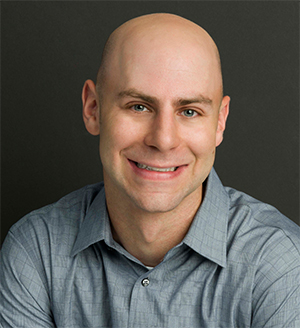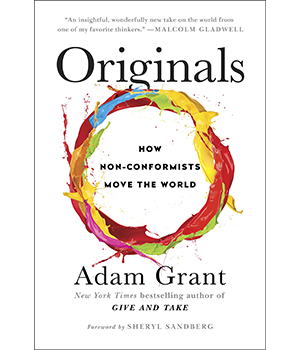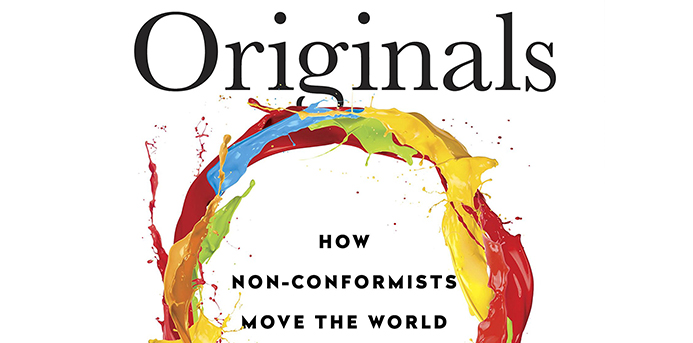
Adam Grant is a rule-follower. The author and professor at the Wharton School of the University of Pennsylvania recounts the one and only time he was called to the principal’s office as a kid: “I found out I wasn’t in trouble and still cried.” After spending the past five to seven years trying to understand people who, unlike himself, march to the beat of their own drummer, he’s written a whole book about them called “Originals: How Non-Conformists Move the World.” (Don’t miss the book’s foreword written by Facebook COO Sheryl Sandberg.)
Specifically, Grant sought to learn from non-conformists how to speak up and fight for ideas — and what it takes to get those ideas heard. Here he offers insight and advice for herd-followers and system-buckers alike.
Find Strength in Weaknesses
Though most people in a pitch or an interview situation tend to lead with their strengths, Grant says he’s found that originals are often open to displaying their weaknesses as well. For example, when Rufus Griscom, co-founder of parenting site Babble, needed investors for his fledgling site, he stood up and presented three reasons not to invest and ended up garnering $3 million in funding. Using the strategy again, Griscom gave Disney five reasons why they shouldn’t buy his company; they bought it for $40 million.
Rather than looking for holes in your pitch, this method challenges listeners to solve the problems you’re raising. Grant says the two takeaways from Griscom’s experience are: “1) It’s pretty clear that when he tells you why not, that he’s critical, honest and open;” and “2) It makes it hard for investors to come up with their own negatives.”
The More Original You Are, The More Radical Your Ideas Will Sound to Others
A truly original idea takes some getting used to. As such, if pioneers want an ear, they often have to make their idea more palpable to others. Grant refers to “tempered radicals” like inventor Meredith Perry and business magnate Elon Musk. Perry found herself frustrated that she was tethered to a wall to charge her devices and decided there had to be a better way. A Google search gave her the idea of using a transducer to transform vibrations in the air into energy. Her original pitch to scientists and engineers had them calling her insane so she changed from “Can you build me a transducer for wireless power?” to “Can you build me a transducer with these properties?”
Similarly, Musk didn’t rush out and tell investors he wants to colonize Mars. He started by saying his goal was to get a commercial vehicle into space. Once the vehicle was in orbit, he began talking about Mars which sounded less crazy given their recent space success. Grant says, “The more original the idea, the more you might have to hide what it really is until you get people believing in it.”
Make the Unfamiliar Familiar
Grant says it takes people 10 to 20 exposures to a new idea before they get it and that often the key is translating the idea into a language that is already understood. The example Grant offers for this piece of advice takes place in the pitch room at Walt Disney Studios. The studio had decided to venture into writing an original movie rather than following their usual practice of adapting a fairy tale and the pitch in discussion was about lions. CEO Michael Eisner said, “Can you make it like ‘King Lear’?” A producer yelled out, “Wait, no, it’s ‘Hamlet’!” The movie got reframed as “‘Hamlet’ with lions” and greenlit; “The Lion King” went on to become the most successful film of 1994.
Find Allies in Unlikely Places
“Research shows that often you bond over methods shared rather than common goals,” Grant says, citing Freud’s “narcissism of small differences” theory. For example, vegans tend to oppose vegetarians more than full-on meat-eaters. So where can you find allies? Surprisingly, it turns out that the most disagreeable people among us are often the most helpful. Grant references a scale with agreeable and disagreeable attributes crossed with giver and taker attributes and says that “disagreeable givers” are your best bet. They are willing to give critical feedback and challenge the status quo. Avoid “agreeable takers” — also known as “fakers.” They think every idea is good but won’t stand by you when it counts.
Hire Differently
“Startups that hire on cultural fit turned out to be less likely to fail and more likely to go public, yet after they go public, those who hire on cultural fit grow more slowly,” Grant says. Adhering to hiring practices focused on cultural fit can create homogeneity in an organization that chokes out original thought. IKEA hires with an eye toward cultural contribution. They ask, “What’s missing from our culture and how can we bring that in?” This results in a diverse workplace chock full of misfits moving the company forward.
Raising Originals
 “The two most-shared articles I’ve ever written were both about kids. Apparently I’ve learned something about kids by studying organizations,” Grant says. In trying to understand who grows up to be truly original, Grant first looked at child prodigies, but it turns out they don’t drive a lot of creativity and rarely go on to change the world. As Grant says, “Practice makes perfect, but it doesn’t make new.” Mastering a sonata requires a different skillset than writing a sonata.
“The two most-shared articles I’ve ever written were both about kids. Apparently I’ve learned something about kids by studying organizations,” Grant says. In trying to understand who grows up to be truly original, Grant first looked at child prodigies, but it turns out they don’t drive a lot of creativity and rarely go on to change the world. As Grant says, “Practice makes perfect, but it doesn’t make new.” Mastering a sonata requires a different skillset than writing a sonata.
The key to developing originality in children is to focus on teaching values rather than rules. This allows kids to consider their own values when making decisions rather than blindly following a set of rules. Parents should engage their children in conversations about integrity and excellence while living the principles they’re teaching. Grant offers an example from his own home: “My daughters were running around our living room putting our six-month-old son in danger. I pulled my six-year-old aside and asked, ‘Why do you think I’m asking you to stop running in the house like crazy?’ She thought and said, ‘Because you don’t want us to hurt our brother.’ Then I asked, ‘Do you want to hurt your brother?’ and she said, ‘No.’ After that, she became the enforcer — it was like a magic trick!”
Want more?
- Have 15 minutes? Watch Grant’s TED Talk recorded this year about the habits of original thinkers.
- Have an hour? Watch Grant’s full Family Action Network (FAN) program (on which this article was based) recorded in Winnetka in April.
- Have a few hours? Read Grant’s most recent book, “Originals: How Non-Conformists Move the World.”
- Follow on Grant on Twitter @AdamMGrant
FAN Annual Sponsors: Martin & Mary L. Boyer Foundation, Compass Health Center, Erikson Institute, Evanston Township High School, Make It Better, Mammal Foundation, New Trier Township High School, Pathways, Tina & Byron Trott
FAN Strategic Partners: Acclaim Media, Center for Talent Development at Northwestern University, Curt’s Cafe, Evanston/Skokie School District 65, Hackstudio, Loyola University Chicago School of Law, Master of Science in Education Program at Northwestern University, North Shore Community Bank & Trust, Northern Suburban Special Education District, New Trier Parent Association, Northwestern University, Redefined Fitness, The Book Stall, The Family Institute at Northwestern University, Y.O.U., YWCA Evanston/North Shore
FAN In-Kind Sponsors: Kirkland & Ellis, Turing Group
More from Make It Better:

